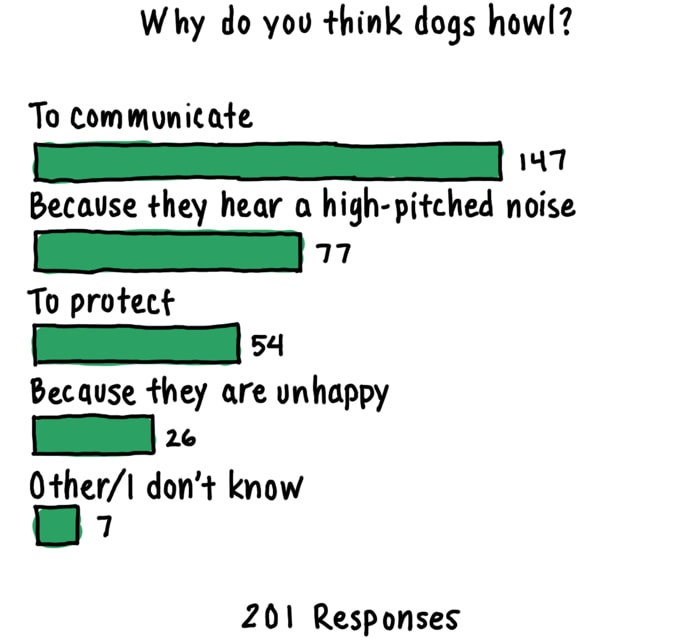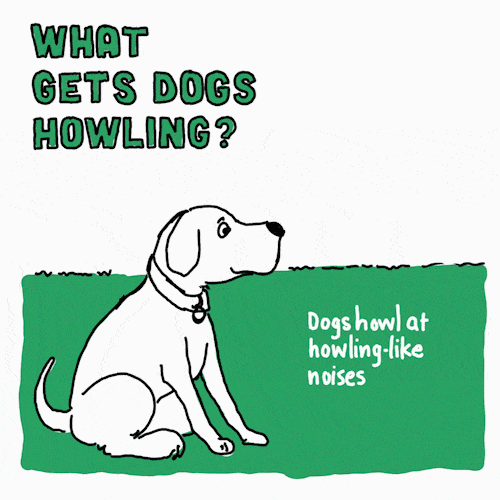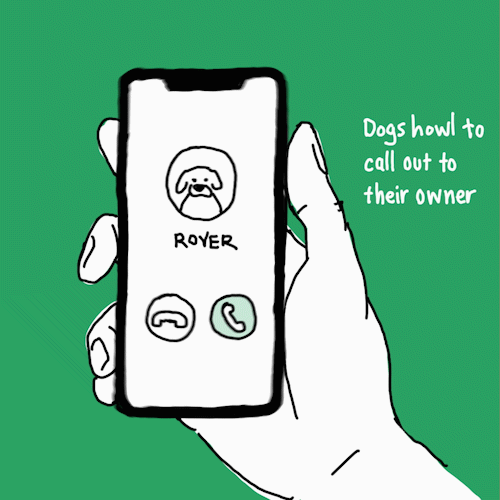

Every pet parent wants to know the meaning of dog howling. Now, we all know what howling sounds like - it’s a high-pitched sound that sounds like a doleful cry. However, many of us are still quite unaware of why do dogs howl. Well, here’s a fun fact: howling for dogs is genetic inheritance. It’s no news that dogs are closely related to wolves. Despite the difference in their sizes, wolves and dogs share around 99% DNA. However, heredity is not the only reason why dogs howl. So, what does it mean when a dog howls, and how can you handle your howling dog? You will find answers to such questions in this article.
To handle a howling dog, you first need to understand the reason why your pet is making this long, wailing noise. Here’s a look at some probable causes of dog howling.
Dogs feel stimulated by high-pitched sounds. Howling is their way of responding to fireworks, sirens, bells, and other noises. This type of howling starts as soon as they hear the shrill sound. As a pet owner, you don’t have to worry about this type of howling since it usually stops when the trigger sound does.
If a dog is excessively attached to you, they might experience separation anxiety. So, once your little companion learns that you won’t be around for a few days, they might start howling under stress and anxiety. If your dog howls every time you need to leave for a long period, it is a sign of hyper-attachment. You might have to treat their anxiety to manage this type of howling. And no, scolding them is not the right way of doing it.
A howling dog could also be seeking attention. And this type of dog howling can be bothersome. You might feel like scolding, questioning, or holding your furball, but you must do the exact opposite of it. Avoid giving your pet any type of attention. Don’t pamper or scold them.
Dogs can sense bad weather, earthquakes, diseases, and so much more. Hence, you cannot rule out the fact that a howling dog could also be trying to alert you of something. Maybe they feel a situation is not right for you or could cause you potential harm. Dogs can sense the intentions of a person through their facial expressions. That’s exactly why dogs howl at some people who try to get near you or your house.
Dogs are still very social animals; it’s just that now we are their pack. When they miss us, they will howl in hopes we respond. Dr. James Serpell, BSc, Ph.D., Professor of Humane Ethics & Animal Welfare at the University of Pennsylvania School of Veterinary Medicine, explains it this way: That [howling] is an attempt on the part of the dog to ask the owner, ‘Where are you so that I can rejoin you?’
Dr. James Serpell doesn’t believe so. “My own research has shown that it is common across breeds. People think huskies may be more prone to group howling.”
Dogs going through separation anxiety may howl excessively when left home alone. Dr. Jo Gale, BVetMed CertLAS MRCVS, Senior Manager for Global Science Advocacy at Waltham Petcare Science Institute, says, “If you reinforce quiet behavior, they are less likely to continue howling.” You can do this by quieting your dog and then leaving for a very brief time before returning and rewarding them when they stay quiet. Gradually increase the time you’re gone to reassure them you’ll always be back.
But what if your pawsome pet is howling due to other reasons? Let’s understand how to handle such situations:
As a pet parent, you must avoid reacting to the howling. This could encourage your dog to howl even more. If you avoid reacting, your dog will understand that howling won’t get their demands met. This might possibly work towards reducing this behaviour in the future.
Pamper your little companion when they do not howl on hearing a siren or bell. Give them attention and love when they are calm to encourage quiet behaviour. Always keep your pet’s favourite treats ready so you can let them know they have been a good boy or good girl by not howling.
If your pooch often reacts to high-pitched sounds, you can even get in touch with a dog trainer. They can work with your dog to change their response to triggering sounds like sirens and fireworks.
Note: Training your fur baby is a time-consuming process. Hence, stay consistent with the actions recommended above and your pet will learn to control their howling triggers.
If you're looking for the perfect dog for you, try our Dog Breed Selector today and enjoy a lifetime of tail-wagging joy.
To understand what a howling dog means to communicate, you need to first read the situation. When dogs howl, it could mean anything–a response to high-pitched sounds, an attempt to attract attention, a suspicion towards someone, etc.
Yes. Since dogs are genetically programmed to howl, it is okay to leave them alone when they do that. However, if it bothers your neighbours, you might want to learn to handle your fur baby or get professional help.
While howling sounds like a long cry, it doesn’t always mean that they are sad.
To stop your dog’s howling, you can reward their calm and quiet behaviour. If they are howling for attention, avoid reacting to it. If you need more help, you may want to reach out to a dog trainer.





As a pet parent, it's hard to hear your furry friend crying. It can be due to separation anxiety, fear, or illness and can be frustrating to deal with. This article will provide practical tips on stopping your pup from crying and help them feel more comfortable and secure. We will guide you through establishing a routine and using calming aids to help your puppy stop crying and live a happier, more peaceful life.
Crying in puppies can vary depending on their age. Older puppies may cry because they are experiencing separation anxiety, are bored, or need to go outside. Meanwhile, newborn puppies cry because they are hungry, uncomfortable, or need warmth. Pay attention to why your puppy cries, so you can provide it with the right care and comfort.
If you are wondering why your pup is crying and how to put a stop to it, the key is to understand the underlying reasons. By gaining this knowledge, you can take the appropriate steps to address the problem and silence the crying. Keep reading to learn more about stopping your pup's tears.
As delicate and helpless beings, newborn puppies rely on their mothers or caregivers to provide for their basic needs. When hungry, cold, or sick, they often cry out in distress, it is like their tiny voice is seeking help. It can be heart-wrenching to hear their cries as they struggle to communicate their needs.
At this stage, the puppies must receive proper care and attention for survival. This may involve giving them warm, nutritious milk from their mothers or finding a suitable substitute if the mother cannot feed them. Providing the puppies with the necessary care will ensure their health and well-being.
In certain situations, puppies may need to receive medication or other forms of treatment to help them recover from an illness or infection. This can be a delicate and complex process, requiring close monitoring and expert knowledge to ensure that puppies receive the appropriate level of care.
As puppies grow older, they often become more vocal when they need to go outside to play or relieve themselves. This can manifest in whining or barking at the door and scratching at it with their paws to grab someone's attention. While this behaviour is natural for puppies, it can be frustrating for their caregivers, particularly when they are trying to get some rest or focus on work.
As a pet parent, providing enough exercise and mental stimulation is important to keep your puppy happy and engaged. If your older puppy is crying or whining, it could signify that they are bored and need entertainment. They may start pacing or circling the room, looking for something to do. If you notice your puppy exhibiting these behaviours, consider taking them for a walk or providing them with a fun new toy to play with.
As puppies grow older, they may become restless and cry when they are tired or ready for bed. This is typical behaviour among puppies, but it can be disruptive for the pet parent. To help your pup settle down for the night, try implementing a bedtime routine and providing a comfortable, cosy bed for it to sleep in. This will not only help your puppy feel more at ease but also allow you to get a good night's rest.
As a responsible pet parent, it's crucial to identify the reasons behind your puppy's crying and take appropriate steps. Whether it's hunger, fear, or loneliness, addressing these underlying causes can create a happier and more comfortable environment for your furry friend. By understanding the root causes of your puppy's crying, you can also provide your canine companion with necessary support and affection to help them feel loved and at ease. Here are some common reasons why puppies may cry:
Suppose your puppy is crying and showing other symptoms of illness. In that case, it could be due to several reasons, ranging from a respiratory infection to a more severe condition such as parvo or distemper. Keep an eye on your puppy's behaviour and pay attention to any changes that may indicate a health problem, so you can act quickly and prevent any potential complications. It is crucial to take your furry friend to the vet as soon as possible for a proper diagnosis and treatment, especially if the crying continues or is accompanied by other signs of discomfort or distress.
As puppies have small stomachs, they require more frequent meals than adult dogs. It's important to provide them with regular, balanced meals and snacks throughout the day to ensure their well-being and happiness. If your puppy is crying and has not eaten in a while, it may be asking for food.
If your puppy is crying, it may be because they feel lonely and neglected. To prevent this, spend quality time with your pup daily. Engage in activities like playing, training, and bonding with them to create a strong, positive relationship and prevent feelings of loneliness.
Puppies overflow with energy and require significant stimulation to stay content and healthy. If your furry friend is crying and appears restless or fidgety, it could be because they are bored and need something to do. Provide your puppy with various toys, games, and activities to keep them entertained and focused.
Suppose your puppy is crying and appears frightened. In that case, it may be because of loud noise, a scary situation, or even a sudden change in their environment. To help calm them down, try speaking softly, offering a treat, or playing soothing music. If the fear continues, seeking the assistance of a professional trainer or behaviourist may be necessary to help your puppy overcome its anxiety.
If your puppy is used to being around other dogs or people and is suddenly left alone for long periods of time, they may become lonely and cry. To prevent this, consider providing your puppy with a companion like another dog or a stuffed animal. Additionally, ensure your puppy has regular opportunities to socialise and interact with others to prevent loneliness and unhappiness.
Consoling a crying puppy can be a challenging and emotional task. Still, making your furry friend feel safe and loved is essential. Here are a few tips to help comfort a crying puppy:
To successfully comfort a crying puppy, it is crucial to have patience and an understanding of what may be causing distress. Once the source of the crying is determined, providing the appropriate support and can help stop its tears and give the puppy a feeling of safety. If needed, seeking advice from a professional can also be beneficial in these situations.